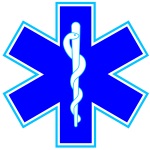Head Injuries
From Protocopedia
Section 6 - TRAUMA
6.07 HEAD INJURIES
INITIAL TRAUMA CARE, (2.02) OXYGEN @ 100% via NRB mask or hyperventilate with BVM.
- Elevate head and shoulders 15 - 30 degrees if systolic BP > 90 mm Hg.
- Refer to ALTERED MENTAL STATUS PRACTICE PARAMETER (5.03).
- If Combative refer to DISSOCIATIVE ANESTHETIC (2.05)
- MORPHINE - Initial dose 2-5 mg IVP, IM or IN followed by 2 mg doses. (Max 15 mg)
- AND / OR
- KETAMINE (KETALAR) Titrate to effect, starting dose of 0.5 mg/kg slow IVP or 1 mg/kg IM.
PEDIATRIC TRAUMATIC BRAIN INJURY MANAGEMENT
- If the following criteria have been met:
- GCS < 8 (Consider airway management with an i-gel if no gag reflex)
- AND Any one of the following:
- Unilateral fixed or dilated pupil
- Unilateral paralysis
- Posturing
- Seizure after injury
- Skull deformity
- 3% Saline bolus at 5 ml/kg (max of 250 ml) IV/IO drip utilizing 10ggts drip set
- Keppra 20mg/kg (not to exceed 1g) IV/IO (may be repeated once at 40mg/kg if seizure continues)
- Maintain ETCO2 between 30-35 mmHg and Oxygen saturation >95%
- Transport patient to nearest Pediatric Trauma Center via appropriate method
OTHER OPTIONS
- MIDAZOLAM (Versed) - Initial dose 2-5mg IV or IN then 2 mg every 30 seconds to 1 minute.
- (Max dose 15 mg) in the intubated patient. IM .07-.08 mg/kg with onset in approximately 15 minutes. IM injection requires immediate IV access upon sedation.
- DIAZEPAM (VALIUM) 2 - 20 mg SLOW IVP or IM to desired effect.
- These drugs may be given in combination for maximum effectiveness.
- Ensure that Pulse Oximeter is in place.
- Ensure that BVM and ROMAZICON and/or NARCAN are readily available.
